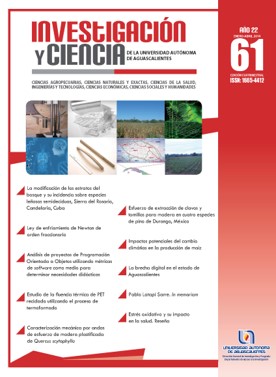Study of thermal fluency of recycled PET using the thermoforming process
DOI:
https://doi.org/10.33064/iycuaa2014613652Keywords:
PET, recycling, thermal creep, temperature, thermoforming, extrusionAbstract
This work presents the results obtained by analyzing the
behavior of thermal fluency of recycled polyethylene
terephthalate, commonly known as PET, obtained
from base plates of soft drinks or water. The study was
conducted through 60 samples of five types of base
plates, in presentations type sheet 100 x 100 mm and
1.5 mm thick. To visualize the behavior of thermal
fluency it resorted to the use of the thermoforming
process by gravity. From the data, those corresponding
to deflections of 25, 30 and 40 mm are reported.
The results allowed identifying a stable behavior in
deflections of 25 mm, at temperatures from 135°C
to 176°C, avoiding the vitrification of the material.
These temperatures have been used in the technical
characterization of the prototype of an extruder for
recycled PET.
Downloads
References
• AL-HAIK, M., VAGHAR, M. R., GARMESTANI, H., y SHAHAWY, M. Viscoplastic analysis of structural polymer composites using stress relaxation and creep data. Composites: Part B 32(2001): 165-170. Elsevier Science Ltd. S1359-8368(00)00042-1, 2001.
• ARTEAGA VÁZQUEZ, A. M. y RAYMONDE REMARQUETTE, N. Propiedades reológicas del polipropileno en flujos elongacionales y de cizallamiento. Scientia Et Technica, XIII(036): 397-400, Universidad Tecnológica de Pereira, ISSN 0122-1701. Septiembre 2007.
• AUS DER WIESCHE, S. Industrial thermoforming simulation of automotive fuel tanks. Applied Thermal Engineering, Elsevier Ltd, 2391-2409, 2004.
• BOURGIN, P., CORMEAU, I., y SAINT-MATIN, T. A first step towards the modelling of the thermoforming of plastic sheets. Journal
of Materials Processing Technology, 54(1995): 1-11. Elsevier Science S. A. SSDI 0924-0136(95)01910-7, 1995.
• BRIODY, C., DUIGNAN, B., JERRAMS, S. y RONAN, S. Prediction of Compressive Creep Behaviour in Flexible Polyurethane Foam Over Long Time Scales and at Elevated Temperatures creep. Polymer Testing, 31(8): 1019-1025. Elsevier Ltd., 2012.
• CORMENZANA CARPIO, J. L. Fluido Dinámica y Orientación Molecular en Flujo de Polímeros Fundidos con Superficies Libres. Tesis Doctoral. Escuela Técnica Superior de Ingenieros Industriales, Universidad Politécnica de Madrid, 2001.
• FLORES, A., BALTA CALLEJA, F. J., y ASANO, T. Creep behavior and elastic properties of annealed cold-drawn poly(ethylene terephthalate): The role of the smectic structure as a precursor of crystallization. Journal of Applied Physics, 90(12) Dec. 15, 2001.
• HIEBER, C. A. y CHIANG, H. H. Spiral-Flow Analysis Including Variable Density Effects. ANTEC´93.
• LECHAT, C., BUNSELL, A. R., y DAVIES, P. Tensile and creep behaviour of polyethylene terephthalate and polyethylene naphthalate fibres. Journal of Materials Science, 46(2): 528-533, 2011.
• MEISSNER, J. y HOSTETTLER, J. A new elongational rheometre for polymer melts and other highly viscoelástico liquids. Rheol,
Acta 33: 1-21, 1994.
• PEGORETTI, A. KOLARIK, J., y SLOUF, M. Phase structure and tensile creep of recycled poly(ethylene terephthalate)/short glass fibers/impact modifier ternary composites. eXPRESS Polymer Letters, 3(4): 235-244, 2009.
• PONZ ESTAÚN, L. Metodología para la caracterización reológica de materiales termoplásticos en condiciones no convencionales para su aplicación a herramientas de simulación, aplicación a un PEHD reciclado. Tesis Doctoral. Centro Politécnico Superior, Universidad de Zaragoza. 2008.
• RAO, N. S., SCHUMACHER, G., y MA, C. T. Prediction Flow Length of Spiral Melt Flows in Injection Molds by a SemiEmpirical Model. ANTEC´99.
• SÁNCHEZ LÓPEZ, C., SAUCEDO ZÁRATE, C. H., ESPARZA GONZÁLEZ, M. S., CASTAÑEDA RAMOS, L. A., SIERRA ORTIZ, R. B., y MARTÍNEZ PRIETO, J. J. Caracterización del proceso de extrusión de PET reciclado. Protocolo de investigación. Convocatoria de Investigación Científica y Tecnológica 2011. Sistema Nacional de Educación Superior Tecnológica; Dirección General De Educación Superior Tecnológica; Instituto Tecnológico de Aguascalientes; Cuerpo Académico Automatización y Control de Sistemas, 2011.
• SÁNCHEZ LÓPEZ, C., SAUCEDO ZÁRATE, C. H., ESPARZA GONZÁLEZ, M. S., CASTAÑEDA RAMOS, L. A., SIERRA ORTIZ, R. B., y MARTÍNEZ PRIETO, J. J. Caracterización del proceso de extrusión de PET reciclado. Informe técnico de avance. Proyectos de Investigación y Desarrollo Tecnológico. Sistema Nacional de Educación Superior Tecnológica; Dirección General De Educación Superior Tecnológica; Instituto Tecnológico de Aguascalientes; Cuerpo Académico Automatización y Control de Sistemas, 2012.
• THOMANN, U. I. y ERMANNI, P. Axial deformation behavior of discontinuous aligned fibre reinforced commingled yarn preforms at thermoforming conditions. Composites Science and Technology, 64, 1899-1912. Elsevier Ltd., 2004.
Downloads
Published
How to Cite
License
Copyright (c) 2014 Carlos Sánchez López, Carlos Humberto Saucedo Zárate, Mario Salvador Esparza González, Luis Antonio Castañeda Ramos

This work is licensed under a Creative Commons Attribution-NonCommercial-ShareAlike 4.0 International License.
Las obras publicadas en versión electrónica de la revista están bajo la licencia Creative Commons Atribución-NoComercial-CompartirIgual 4.0 Internacional (CC BY-NC-SA 4.0)









